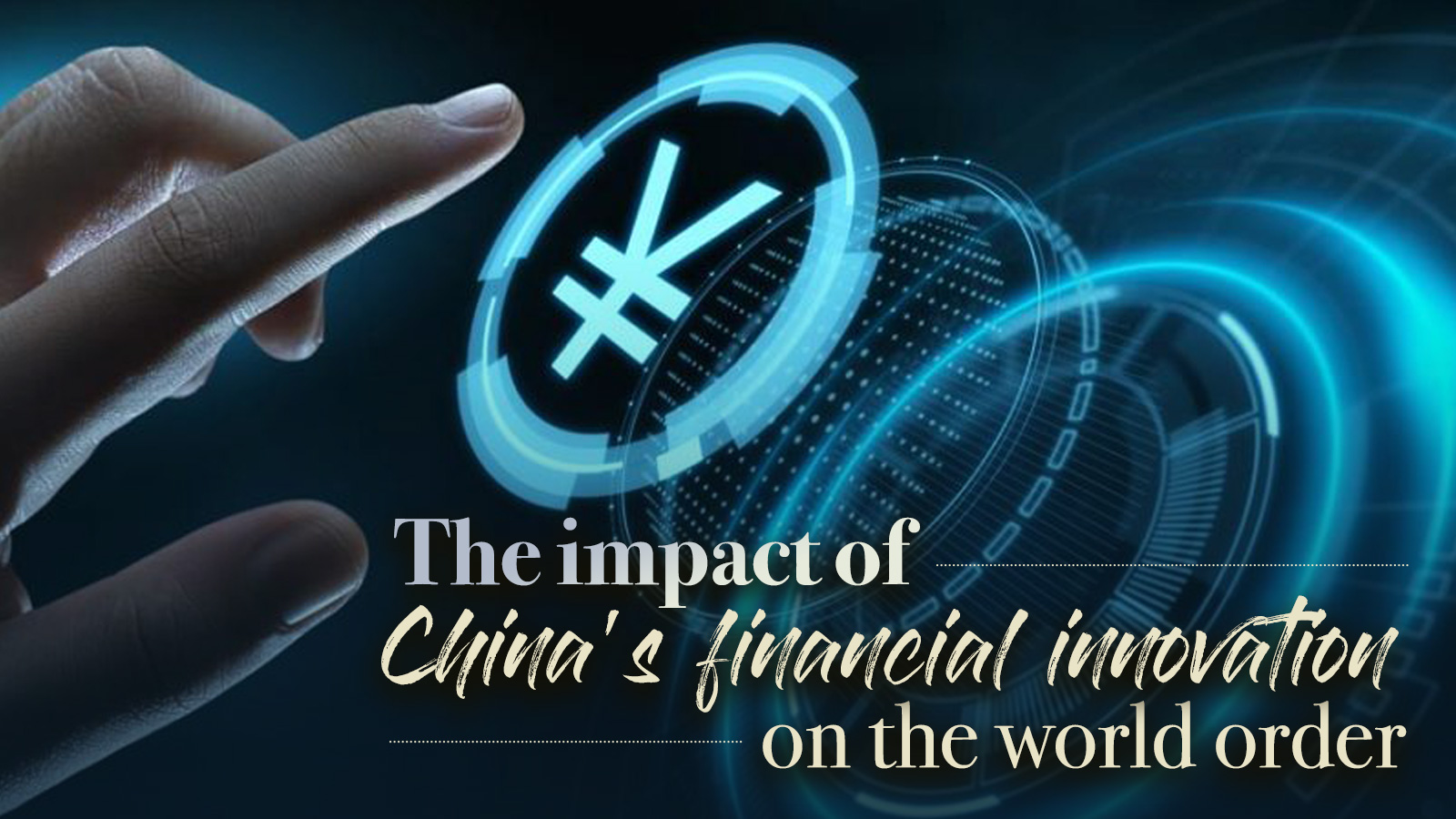
Editor's note: The COVID-19 pandemic in 2020 has changed the lives of everyone on the planet and may even change the global landscape. While Western countries are still struggling with COVID-19, China has started its economic recovery. Here is the sixth piece in our "China In Focus" series during the Two Sessions: China's financial innovation. James Rae is a professor at California State University, Sacramento. He was also a Fulbright Scholar at Beijing Foreign Studies University from 2017 to 2018. The article reflects the author's opinions, and not necessarily the views of CGTN.
Scholars increasingly recognize the role of economic power over military power in international relations, focusing on trade, development, and finance. However, of the three, finance is the most driven by technological innovations, and since the 2008 global financial crisis has dramatically changed in manner and scale. In this regard, such innovation is occurring foremost in China and will have major ramifications for daily commerce, transnational trade, development projects, and foreign investment along with global financial governance and great power relations.
The United States ascended to the role of architect of the modern financial system in 1944 at the conference in Bretton Woods, New Hampshire, where along with the British primarily, the Americans built the World Bank, the International Monetary Fund, and considered an International Trade Organization.
At a time when the world was devastated from war, the United States' domestic production was now full scale and totaled over half of the global economy. As an export powerhouse and engine of international trade, with its currency backed by a stable commodity in gold, the United States successfully managed a fixed rate currency exchange system and governed a period of economic stability between capitalist countries for nearly three decades.
As its power began to wane from 1971, taking on greater fiscal debt, reducing domestic manufacturing, suffering vulnerability to commodity price shocks from petroleum, and the like, its economy today is less than one-fifth of the world economy. The one primary advantage the United States retained was its dominance in the global financial sector.
Despite a half century of relative economic decline, in 2020 the United States' tenuous hegemonic perch is largely owed to its strong influence over the global financial architecture. The U.S. dollar is still central, despite the rise and fall of proposed alternatives from the Japanese yen, to the euro, and the Chinese yuan.
Most global trade, including virtually all commerce in petroleum, is conducted in U.S. dollars. Most all international transactions electronically or physically pass through the United States via American banks in New York with their payments settled by America's central bank, the Federal Reserve, and are thus occurring on American soil and subject to American law. Such transactions are principally governed by the Belgian-based conglomerate known as the Society for Worldwide Interbank Financial Telecommunication (SWIFT), which is heavily influenced by American oversight and increasingly since 2001 by American foreign policy priorities.
Indeed, well more than half of all foreign central bank reserves are held in American dollars. Of course, the United States and its allies also control the predominant share of voting rights at the World Bank and IMF and continue to leverage their priorities through international financial institutions and Western-based private banks and investment funds.

China's UnionPay cards. /Xinhua
China's UnionPay cards. /Xinhua
These extraordinary advantages, the so-called "exorbitant privilege," allow the United States to run enormous trade deficits, budget deficits, and indeed personal financial deficits, adding up to the world's largest debt (25 trillion U.S. dollars and counting), without yet dramatically sacrificing its standard of living and economic power on the global stage, while borrowing in its own currency with favorable rates. That reckoning has been coming and China's financial innovations are accelerating such alternatives.
Ironically, the catalyst for such changes partly result from the over-leveraged positions of American private sector commercial and investment banks that spurred challenges from new crypto-currencies, and the decision by American presidents to empower its financial might against other countries in foreign policy skirmishes, notably jeopardizing camaraderie with Europe over sanctions on Iran. Specifically, the United States now restricts SWIFT's clearing of international banking transactions from sanctioned countries as a new form of dollar diplomacy, limiting access to the global market.
These tactics have alienated much of the world. The Europeans have been quick to investigate opportunities to free themselves from American shackles, the European Central Bank has formed a working group to explore central bank digital currencies (CBDC), with the goal of forging a "European identity and governance" and "global acceptance in the long run."
France's Minister of the Economy and Finance Bruno Le Maire boldly declared in 2018, "I want Europe to be a sovereign continent, not a vassal, and that means having totally independent financing instruments." Germany's Federal Minister of Finance Olaf Scholz echoed these worries about foreign interference including from the United States in declaring "such a payment system would be good for the [European] financial center and its integration into the world financial system."
While Europe may be eager for an alternative, it is not a nimble actor and faces numerous obstacles in formulating a workable model that is acceptable to its 27 diverse members. Meanwhile, China is leading the way in developing such an alternative. China's CBDC aligns with its nascent payments system framework outside of American-dominated SWIFT through the Cross-Border Inter-Bank Payments System (CIPS), which can clear and settle international yuan-denominated financial transactions and is developing an independent messaging system that is not dependent on SWIFT or the American dollar.
In April 2020, the People's Bank of China launched its digital currency in Chengdu, Shenzhen, Suzhou, and Xiong'an. This experiment is all the more impressive since it results from only a roughly five-year plan of action and is already "online." At a minimum, it will continue the conversion of the yuan to an international currency and accelerate China's role as hub of regional financing and pivot point for global economic integration through alternative bilateral lending and investment through the Belt and Road Initiative and commensurate Silk Road partnerships along with other Chinese e-money linkages across Africa and Asia. Here, Alibaba, the People's Bank of China, Tencent, Ping An Insurance, and the China State Grid Corporation represent private and public ventures to promote economies of scale through blockchain, which enables transactions in trade without a central authority.
China's financial innovation contributes to the growing multi polarity and pluralism of the international economic order. The potential of CIPS is to tangibly migrate the international financial order away from hegemonic dictates and toward the notion of mutual reciprocity for mutual benefit.
As a result, it will become challenging for the United States to exercise its extraterritorial ambitions of pressuring and penalizing sovereign states that run afoul of its peculiar self-interests, most notably President Trump's obsession with a "maximum pressure" campaign toward Iran that undermined the widely accepted Joint Comprehensive Plan of Action.
On such an issue, China, Russia, and the Europeans all oppose American leveraging of its financial hegemony and welcome China's new gambit. Clearly, China is not seeking to overthrow or replace the U.S. dollar-denominated system with a yuan-backed order, but rather seeks to guarantee its own sovereignty by building a marketplace that encourages multilateral solutions to global financial governance.
For now, the United States is unwilling to cede equitable participation in the predominant financial order, is unable to formulate a new internal consensus to address future trends in financial innovation yet is unprepared to develop a digital currency of its own. The diffusion of global financing systems will also compel the United States to a reckoning over its profligate spending and overweening debt which imperils its own future competitiveness.
(If you want to contribute and have specific expertise, please contact us at opinions@cgtn.com.)